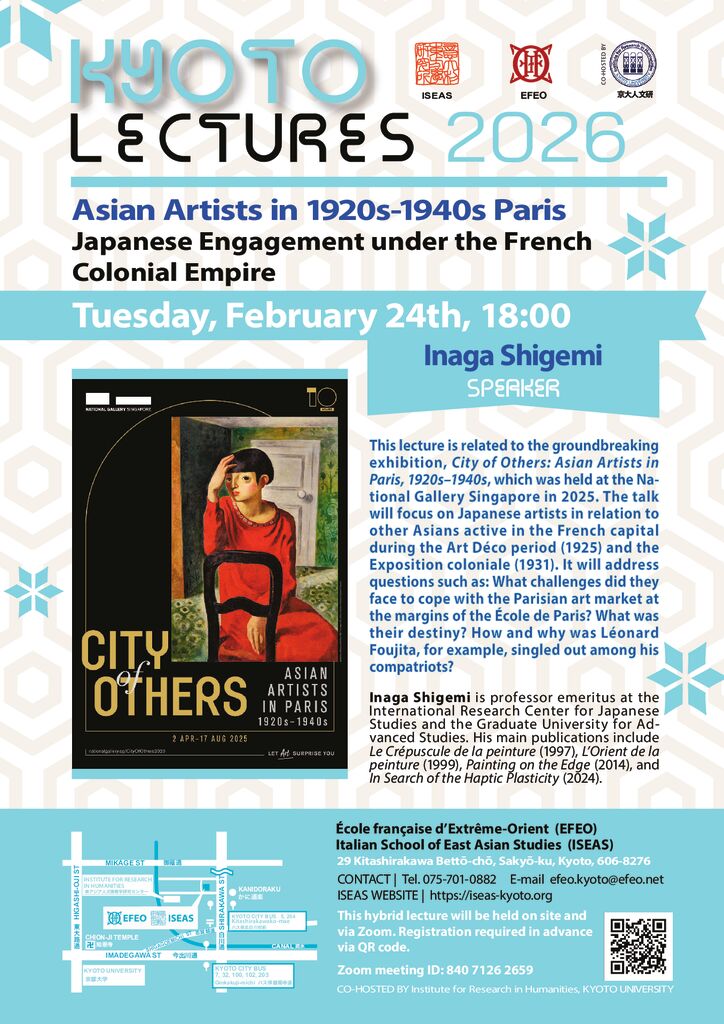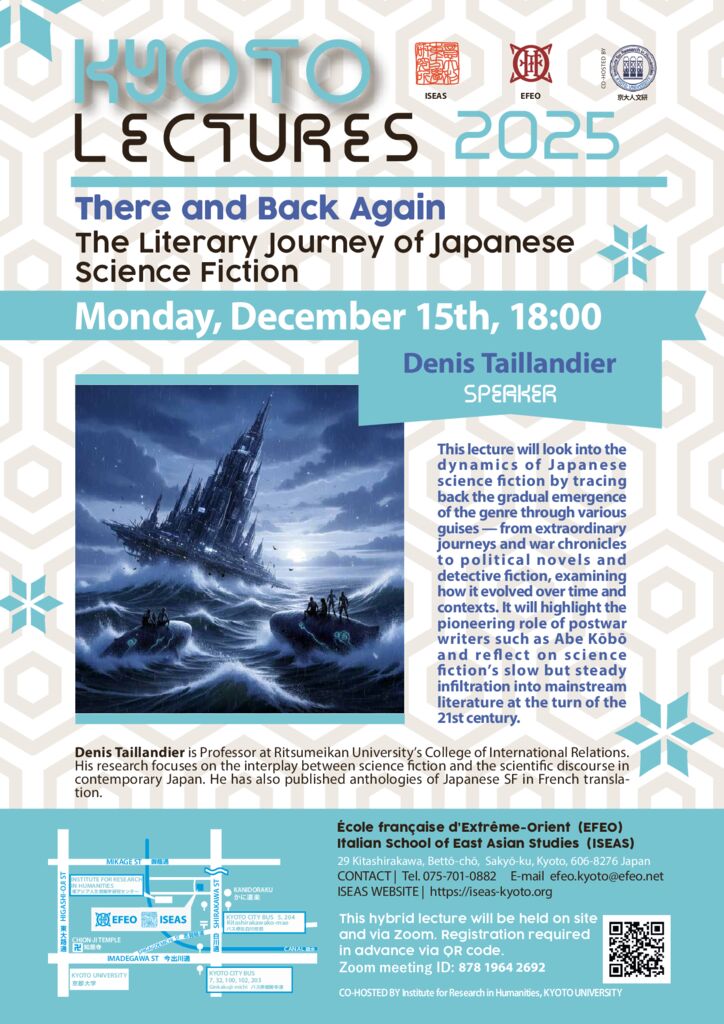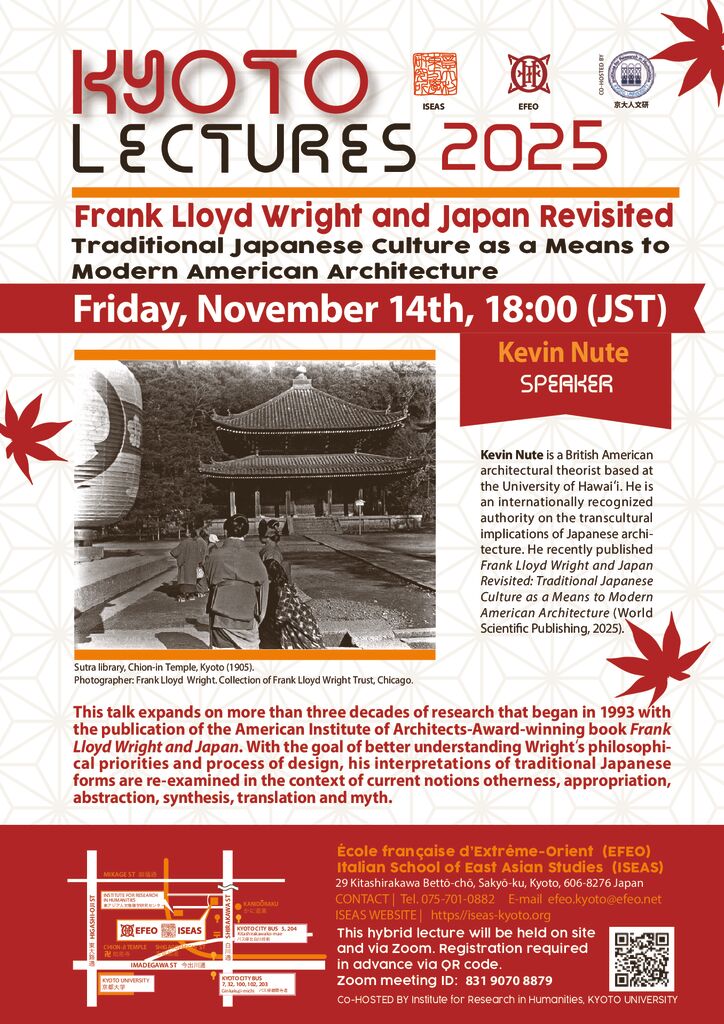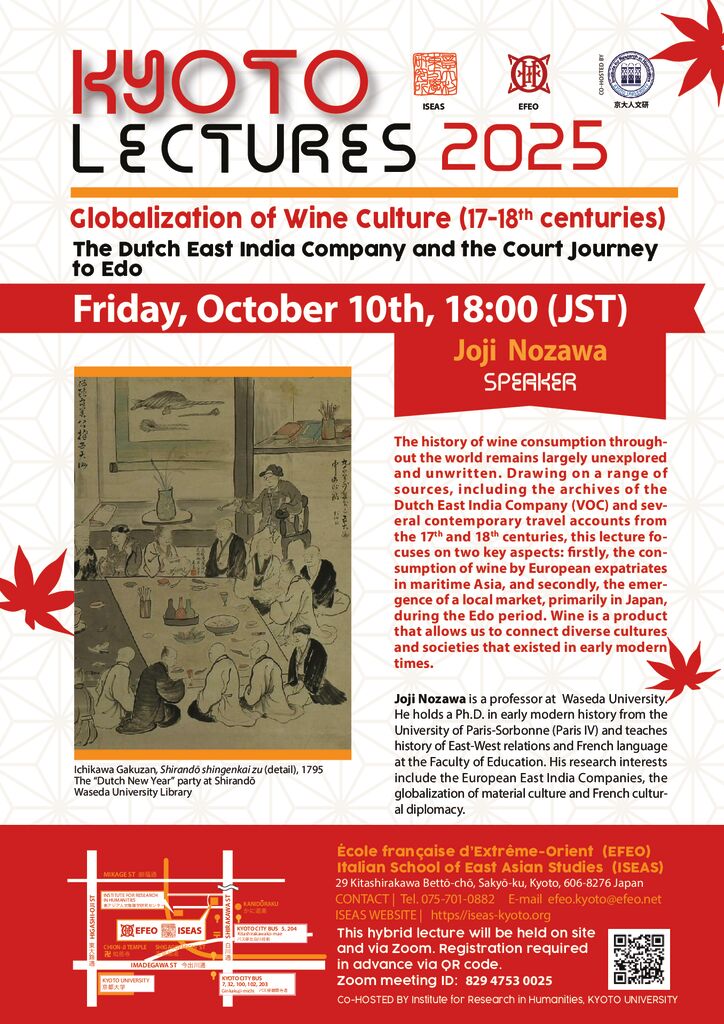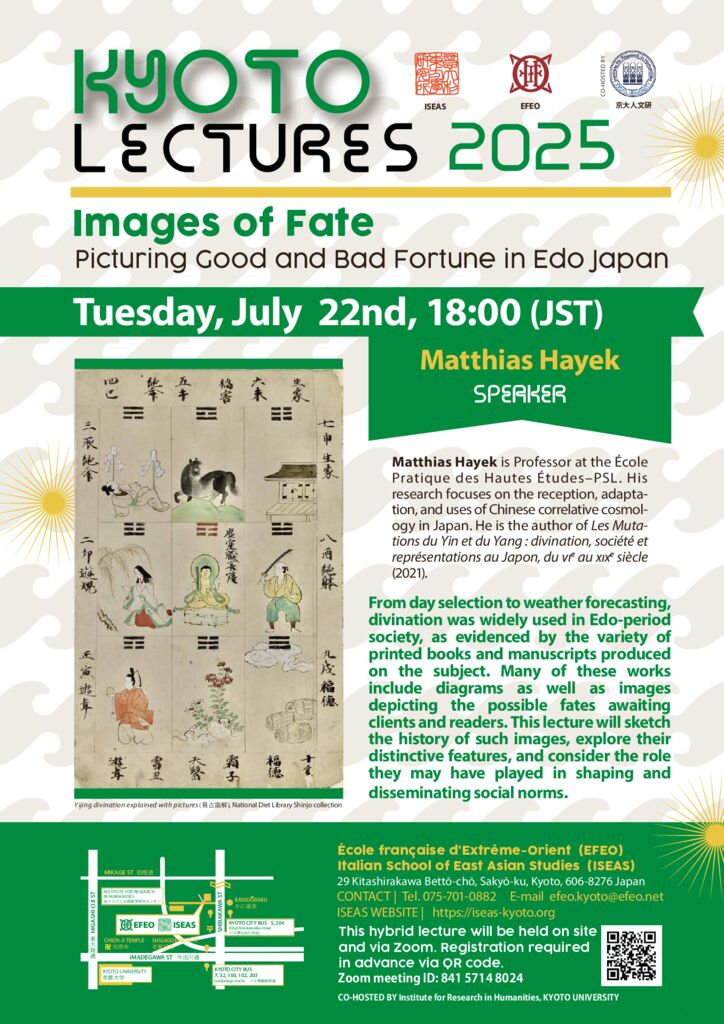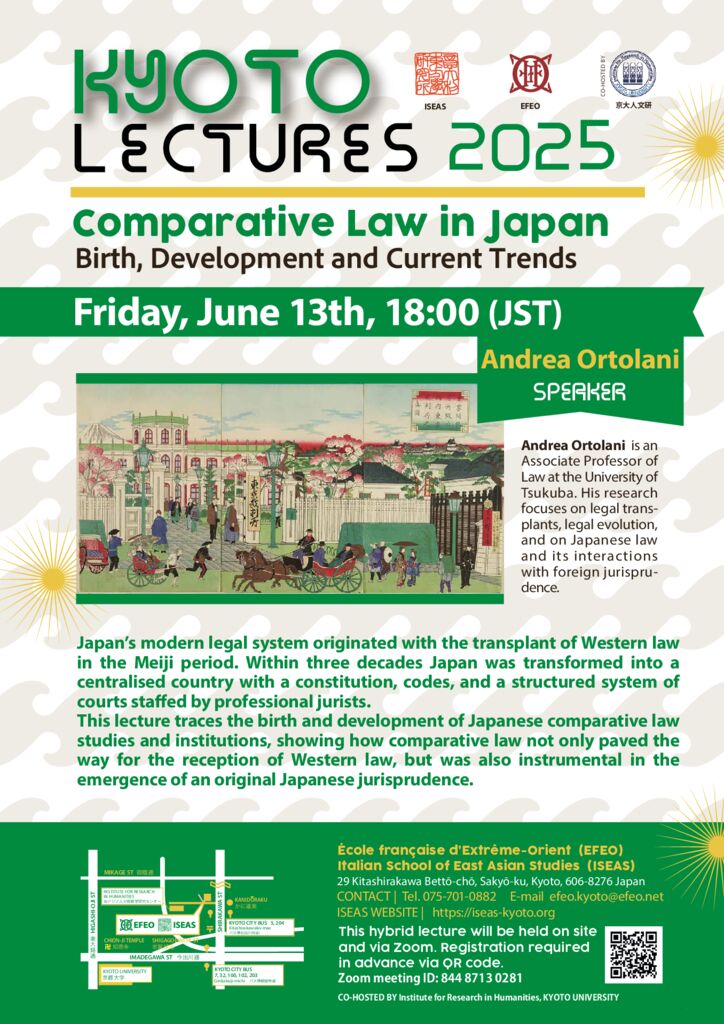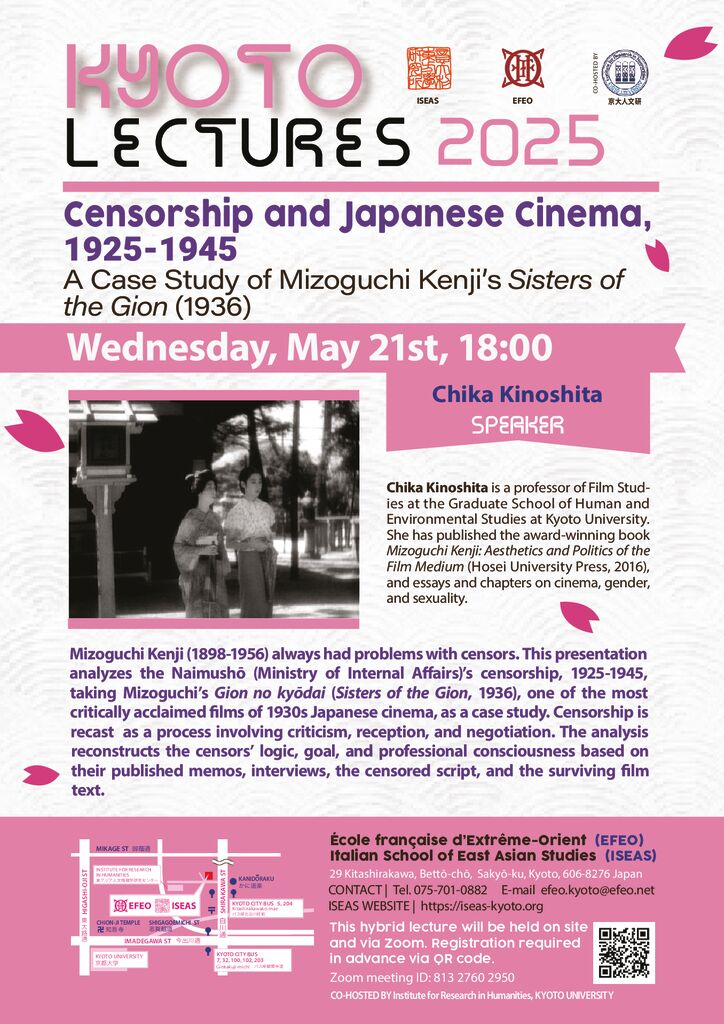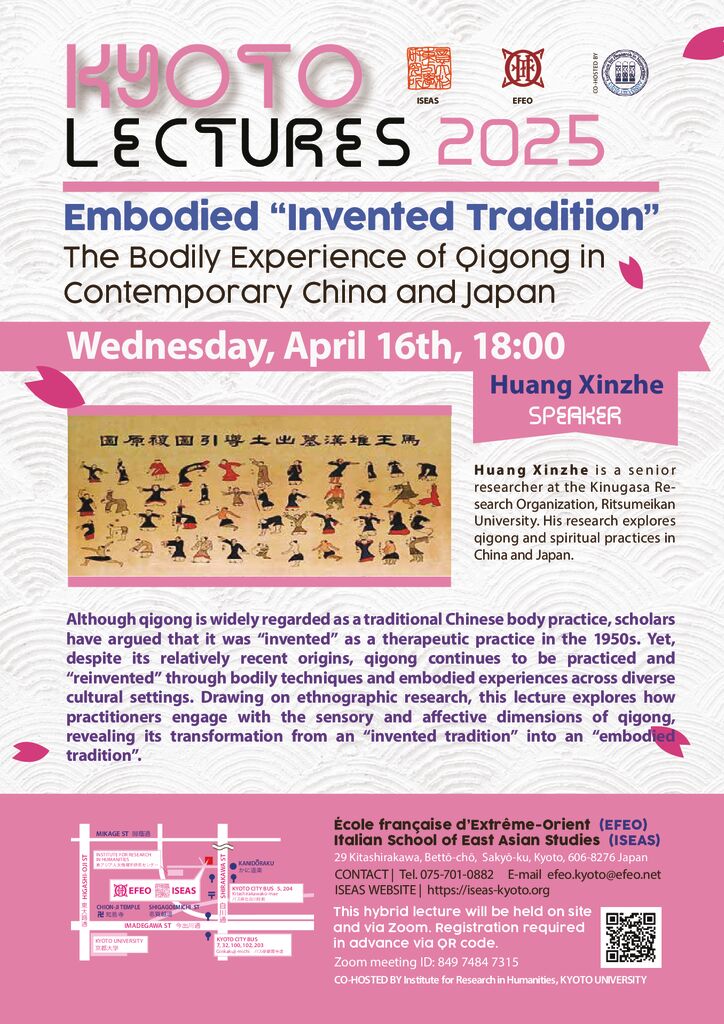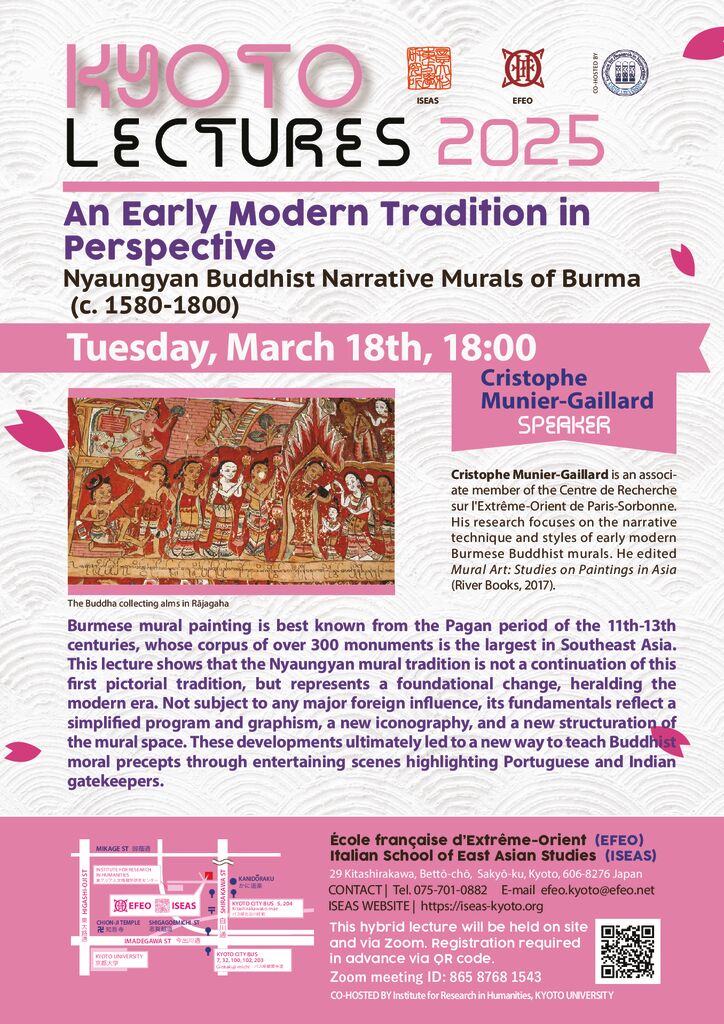Kyoto Lectures
Asian Artists in 1920s–1940s Paris
Japanese Engagement under the French Colonial Empire
Inaga Shigemi
February 24th, 2026 18:00
This lecture is related to the groundbreaking exhibition, City of Others: Asian Artists in Paris, 1920s–1940s, which was held at the National Gallery Singapore in 2025. The talk will focus on Japanese artists in relation to other Asians active in the French capital during the Art Déco period (1925) and the Exposition coloniale (1931). It will address questions such as: What challenges did they face to cope with the Parisian art market at the margins of the École de Paris? What was their destiny? How and why was Léonard Foujita, for example, singled out among his compatriots?
Inaga Shigemi is professor emeritus at the International Research Center for Japanese Studies and the Graduate University for Advanced studies. His main publications include Le Crépuscule de la peinture (1997), L’Orient de la peinture (1999), Painting on the Edge (2014), and In Search of the Haptic Plasticity (2024).
This hybrid lecture will be held on site (registration required in advance from here) and via Zoom.
Zoom Link: https://us02web.zoom.us/j/84071262659
Meeting ID: 840 7126 2659
Kyoto Lectures
From Metabolism to Post Metabolism
Japanese Cities between Utopian Visions and Reality in Flux
Raffaele Pernice
29 gennaio 2026 18:00
The lecture will critically outline the ideas and works of the Group Metabolism and their iconic projects in the context of the continuous transformation of the Japanese urban environment. Beyond the forms and the aesthetics of their propositions, the cultural relevance and the methodological approach proposed by Metabolism, rooted in the responsiveness of Japanese design and the adaptability of the traditional architectural construction systems, still retain some relevance. Its importance is in the latent capability to address the great criticalities of our time in Japan and globally.
Raffaele Pernice is Senior Lecturer in Architecture and Urbanism at UNSW Sydney, and a 2026 JSPS BRIDGE Fellow at Kyushu University. Recipient of a Monbukagakushō Scholarship and a JSPS Postdoc Research Fellowship, he holds a PhD in Architecture from Waseda University and a MA in Architecture from IUAV University, Italy. He is editor of the book The Urbanism of Metabolism (Routledge, 2022).
This hybrid lecture will be held on site (registration required in advance from here) and via Zoom.
Zoom Link: https://us02web.zoom.us/j/86047783858
Meeting ID: 860 4778 3858
Kyoto Lectures
There and Back Again
The Literary Journey of Japanese Science Fiction
Denis Taillandier
December 15th, 2025 18:00
This lecture will look into the dynamics of Japanese science fiction by tracing back the gradual emergence of the genre through various guises— from extraordinary journeys and war chronicles to political novels and detective fiction, examining how it evolved over time and contexts. It will highlight the pioneering role of postwar writers such as Abe Kōbō and reflect on science fiction’s slow but steady infiltration into mainstream literature at the turn of the 21st century.
Denis Taillandier is Professor at Ritsumeikan University’s College of International Relations. His research focuses on the interplay between science fiction and the scientific discourse in contemporary Japan. He has also published anthologies of Japanese SF in French translation.
This hybrid lecture will be held on site (registration required in advance from here) and via Zoom.
Zoom Link: https://us02web.zoom.us/j/87819642692
Meeting ID: 878 1964 2692
Kyoto Lectures
Frank Lloyd Wright and Japan Revisited
Traditional Japanese Culture as a Means to Modern American Architecture
Kevin Nute
November 14th, 2025 18:00
This talk expands on more than three decades of research that began in 1993 with the publication of the American Institute of Architects-Award-winning book Frank Lloyd Wright and Japan. With the goal of better understanding Wrightʻs philosophical priorities and process of design, his interpretations of traditional Japanese forms are re-examined in the context of current notions otherness, appropriation, abstraction, synthesis, translation and myth.
Kevin Nute is a British American architectural theorist based at the University of Hawaiʻi. He is an internationally recognized authority on the transcultural implications of Japanese architecture. He recently published Frank Lloyd Wright and Japan Revisited: Traditional Japanese Culture as a Means to Modern American Architecture (World Scientific Publishing, 2025).
This hybrid lecture will be held on site (registration required in advance from here) and via Zoom.
Zoom Link: https://us02web.zoom.us/j/83190708879
Meeting ID: 831 9070 8879
Kyoto Lectures
Globalization of Wine Culture (17-18th centuries)
The Dutch East India Company and the Court Journey to Edo
Joji Nozawa
October 10th, 2025 18:00
The history of wine consumption throughout the world remains largely unexplored and unwritten. Drawing on a range of sources, including the archives of the Dutch East India Company (VOC) and several contemporary travel accounts from the 17th and 18th centuries, this lecture focuses on two key aspects: firstly, the consumption of wine by European expatriates in maritime Asia, and secondly, the emergence of a local market, primarily in Japan, during the Edo period. Wine is a product that allows us to connect diverse cultures and societies that existed in early modern times.
Joji Nozawa is a professor at Waseda University. He holds a Ph.D. in early modern history from the University of Paris-Sorbonne (Paris IV) and teaches history of East-West relations and French language at the Faculty of Education. His research interests include the European East India Companies, the globalization of material culture and French cultural diplomacy.
This hybrid lecture will be held on site (registration required in advance from here) and via Zoom.
Zoom Link: https://us02web.zoom.us/j/82947530025
Meeting ID: 829 4753 0025
Kyoto Lectures
Images of Fate
Picturing Good and Bad Fortune in Edo Japan
Matthias Hayek
July 22nd, 2025 18:00
From day selection to weather forecasting, divination was widely used in Edo-period society, as evidenced by the variety of printed books and manuscripts produced on the subject. Many of these works include diagrams as well as images depicting the possible fates awaiting clients and readers. This lecture will sketch the history of such images, explore their distinctive features, and consider the role they may have played in shaping and disseminating social norms.
Matthias Hayek is Professor at the École Pratique des Hautes Études–PSL. His research focuses on the reception, adaptation, and uses of Chinese correlative cosmology in Japan. He is the author of Les Mutations du Yin et du Yang : divination, société et représentations au Japon, du vie au xixe siècle (Collège de France, 2021).
This hybrid lecture will be held on site (registration required in advance from here) and via Zoom.
Zoom Link: https://us02web.zoom.us/j/84157148024
Meeting ID: 841 5714 8024
Kyoto Lectures
Comparative Law in Japan
Birth, Development and Current Trends
Andrea Ortolani
June 13th, 2025 18:00
Japan’s modern legal system originated with the transplant of Western law in the Meiji period. Within three decades Japan was transformed into a centralised country with a constitution, codes, and a structured system of courts staffed by professional jurists.
This lecture traces the birth and development of Japanese comparative law studies and institutions, showing how comparative law not only paved the way for the reception of Western law, but was also instrumental in the emergence of an original Japanese jurisprudence.
Andrea Ortolani is an Associate Professor of Law at the University of Tsukuba. His research focuses on legal transplants, legal evolution, and on Japanese law and its interactions with foreign jurisprudence.
This hybrid lecture will be held on site (registration required in advance from here) and via Zoom.
Zoom Link: https://us02web.zoom.us/j/84487130281
Meeting ID: 844 8713 0281
Kyoto Lectures
Censorship and Japanese Cinema, 1925-1945
A Case Study of Mizoguchi Kenji’s Sisters of the Gion (1936)
Chika Kinoshita
May 21st, 2025 18:00
Mizoguchi Kenji (1898-1956) always had problems with censors. This presentation analyzes The Naimushō (Ministry of Internal Affairs)’s censorship, 1925-1945, taking Mizoguchi’s Gion no kyodai (Sisters of the Gion, 1936), one of the most critically acclaimed films of the 1930s Japanese cinema, as a case study. Censorship is recast as a process involving criticism, reception, and negotiation. The analysis reconstructs the censors’ logic, goal, and professional consciousness based on their published memos, interviews, the censored script, and the surviving film text.
Chika Kinoshita is a professor of Film Studies at the Graduate School of Human and Environmental Studies at Kyoto University. She has published the award-winning book Mizoguchi Kenji: Aesthetics and Politics of the Film Medium (Hosei University Press, 2016), and essays and chapters on cinema, gender, and sexuality in English and Japanese.
This hybrid lecture will be held on site (registration required in advance from here) and via Zoom.
Zoom Link: https://us02web.zoom.us/j/81327602950
Meeting ID: 813 2760 2950
Kyoto Lectures
Embodied “Invented Tradition”
The Bodily Experience of Qigong in Contemporary China and Japan
Huang Xinzhe
April 16th, 2025 18:00
Although qigong is widely regarded as a traditional Chinese body practice, scholars have argued that it was “invented” as a therapeutic practice in the 1950s. Yet, despite its relatively recent origins, qigong continues to be practiced and “reinvented” through bodily techniques and embodied experiences across diverse cultural settings. Drawing on ethnographic research, this lecture explores how practitioners engage with the sensory and affective dimensions of qigong, revealing its transformation from an “invented tradition” into an “embodied tradition”.
Huang Xinzhe is a senior researcher at the Kinugasa Research Organization, Ritsumeikan University. His research explores qigong and spiritual practices in China and Japan. He recently published a book in Japanese (The Anthropology of Qi: Embodied experience in Qigong Practices, Sekai Shisōsha 2025) based on his PhD dissertation.
This hybrid lecture will be held on site (registration required in advance from here) and via Zoom.
Zoom Link: https://us02web.zoom.us/j/84974847315
Meeting ID: 849 7484 7315
Kyoto Lectures
An Early Modern Tradition in Perspective
Nyaungyan Buddhist Narrative Murals of Burma (c. 1580-1800)
Cristophe Munier-Gaillard
March 18th, 2025 18:00
Burmese mural painting is best known from the Pagan period of the 11th-13th centuries, whose corpus of over 300 monuments is the largest in Southeast Asia. This lecture shows that the Nyaungyan mural tradition is not a continuation of this first pictorial tradition, but represents a foundational change, heralding the modern era. Not subject to any major foreign influence, its fundamentals reflect a simplified program and graphism, a new iconography, and a new structuration of the mural space. These developments ultimately led to a new way to teach Buddhist moral precepts through entertaining scenes highlighting Portuguese and Indian gatekeepers.
Cristophe Munier-Gaillard is an associate member of the Centre de Recherche sur l’Extrême-Orient de Paris-Sorbonne. His research focuses on the narrative technique and styles of early modern Burmese Buddhist murals. He edited Mural Art: Studies on Paintings in Asia (River Books, 2017).
This hybrid lecture will be held on site (registration required in advance from here) and via Zoom.
Zoom Link: https://us02web.zoom.us/j/86587681543
Meeting ID: 865 8768 1543
